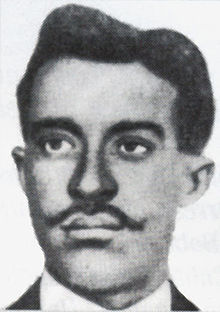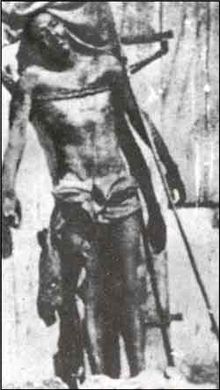- Charlemagne Péralte
-
Charlemagne Masséna Péralte (1886 - 1 November 1919) was a Haitian nationalist leader who opposed the US Invasion of his country in 1915. Leading guerrilla fighters called the Cacos, he posed such a challenge to the US forces in Haiti that the occupying forces had to upgrade their presence in the country.[citation needed] Péralte remains a highly praised Haitian hero.
Contents
Early life
Born in 1886 in the central city of Hinche, Péralte was born into a family that had migrated from an area that is the present day Dominican Republic, (Péralte is a French version of the Spanish name Peralta). Péralte is revered on both sides of the island, in Haïti and in the Dominican Republic.
Name on birth certificate: François Borgia Charlemagne Peralte
Date of birth on birth certificate: 10 October 1885
His father was General Remi Massena Peralte.
Source for correction: 1885–1985, Un Centenaire; Charlemagne Peralte,, Georges Michel. Privately published in Port-au-Prince, 1989. Footnote, p. 19. Cites research of Roger Gaillard concerning birth and baptismal certificates in Premiere Ecrasement du Cacoism, Port-au-Prince:Le Natal, 1981. Also appears in Douglas Henry Daniels's English translation of Michel's book,Charlemagne Peralte and the First American Occupation. Dubuque, Iowa: Kendall/Hunt Publishing CO., 1996.
Guerrilla resistance
An officer by career, Charlemagne Péralte was the military chief of the city of Léogane when the US Marines invaded Haïti in July 1915. (See United States occupation of Haïti (1915–1934))
Refusing to surrender to foreign troops without fighting, Péralte resigned from his position and returned to his native town of Hinche to take care of his family's land. In 1917, he was arrested for assaulting the home of an American Officer of the occupation troops, and was sentenced to five years of forced labor. Escaping his captivity, Charlemagne Péralte gathered a group of nationalist rebels and started guerrilla warfare against the US troops.
The troops led by Péralte were called "Cacos", a name that harked back to rural troops that historically took part in the political turmoil of late 19th century Haïti. The guerrilla warriors of the Cacos were such strong adversaries that the United States upgraded the US Marine contingent in Haïti and even employed airplanes for counter-guerrilla warfare.[citation needed]
Death and aftermath
Péralte waged an effective guerrilla war against the US occupiers and succeeded in establishing a provisional government in the north of the country in 1917. But he was betrayed and murdered by one of his generals. The US marines wished to make an example of Péralte by taking a photograph of his body tied to a door for distribution throughout the country.
Centre for Research on Globalization [1]After two years of guerrilla warfare, leading Péralte to declare a provisional government in the north of Haïti, Charlemagne Péralte was betrayed by one of his officers, Jean-Baptiste Conzé, who led disguised US Marines Sergeant Herman H. Hanneken (later meritoriously promoted to Second Lieutenant for his exploits) and Corporal William Button into the rebels camp, near Grand-Rivière Du Nord.
Péralte was shot in the heart at close range and assassinated. His assassins then fled with his body during the skirmish and chaos that ensued.
In order to demoralize the Haïtian population, the US troops took a picture of Charlemagne Péralte's body tied to a door, and distributed it in the country. The effect was the opposite. Betrayed and killed at the age of 33, Charlemagne Péralte took the dimension of a martyr for the Haïtian nation.
Charlemagne Péralte remains were unearthed after the end of the US occupation in 1935. A national funeral, attended by the then-President of Haïti, Sténio Vincent, was held in Cap-Haïtien, where his grave can still be seen today.
A portrait of Charlemagne Péralte can now be seen on the Haïtian coins issued by the government of Jean-Bertrand Aristide after his 1994 return under the protection of US troops.
As a footnote, for their daring exploit, Corporal Button and Sergeant Hanneken (1893–1986) were both awarded the Medal of Honor for killing the "supreme bandit of Haiti". Hanneken later served in World War II, notably at Guadalcanal and ended his career as a Brigadier General. In his late days, he constantly declined to comment on his exploits in Haïti, notably to Haïtian journalist asking for interviews on the 100th anniversary of Péralte's birth, in 1986.[citation needed]
References
- ^ France and the History of Haiti by Gearóid Ó Colmáin, Global Research, January 22, 2010
Categories:- 1886 births
- 1919 deaths
- Haitian rebels
Wikimedia Foundation. 2010.


